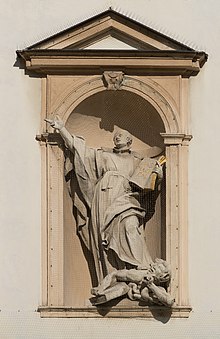
Back Kettery Afrikaans Häresie ALS هرطقة Arabic هرطقه ARZ Herexía AST Bidət Azerbaijani Мөртәтлек Bashkir Ерась Byelorussian Ерась BE-X-OLD Ерес Bulgarian



Heresy is any belief or theory that is strongly at variance with established beliefs or customs, particularly the accepted beliefs or religious law of a religious organization.[1][2] A heretic is a proponent of heresy.[1]
Heresy in Christianity, Judaism, and Islam has at times been met with censure ranging from excommunication to the death penalty.[3]
Heresy is distinct from apostasy, which is the explicit renunciation of one's religion, principles or cause;[4] and from blasphemy, which is an impious utterance or action concerning God or sacred things.[5] Heresiology is the study of heresy.
- ^ a b "Heresy | Define Heresy at Dictionary.com". Dictionary.reference.com. Retrieved 2013-04-15.
- ^ "heresy – definition of heresy in English from the Oxford dictionary". oxforddictionaries.com. Archived from the original on July 20, 2012.
- ^ Sandle, Mark. 2007. "Soviet and Eastern bloc Marxism." pp. 59–77 in Twentieth-Century Marxism, edited by D. Glaser and D. M. Walker. London: Routledge. ISBN 978-1-13597974-4. p. 62.
- ^ "Apostasy | Learn everything there is to know about Apostasy at". Reference.com. Archived from the original on 2013-07-17. Retrieved 2013-04-15.
- ^ "Definitions of "blasphemy" at Dictionary.com". Dictionary.reference.com. Retrieved 2015-11-27.